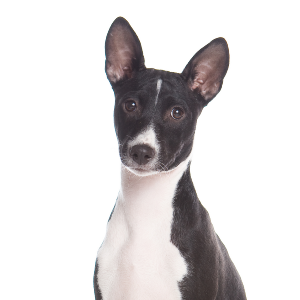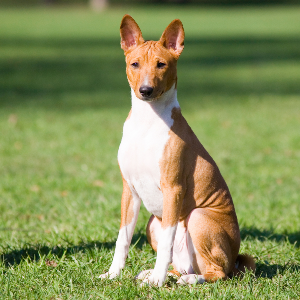
Basenji
Basenjis are independent, intelligent, and interesting dogs. Their stubborn natures have earned them a reputation of being difficult to train. But with a little positivity and patience, the Basenji makes a charming and delightful companion.
16–34 lb
15–17 in
12–14 yr
Middle Eastern and African
Interested in discovering if your dog is a Basenji?
Check out Wisdom Panel's DNA tests.

Basenji Traits
General Appearance
This small, short-haired breed has a wrinkled head, tall, pointed ears, and a tightly curled tail. Smooth and poised with dark hazel, almond-shaped eyes, Basenjis always appear ready for adventure.
Coat and Coloring
The Basenji's short, fine coat is easy to care for. These dogs can be chestnut red, pure black, black and tan, or brindle. And they may have white on their feet, chest, tail tip, legs, blaze, and collar.
Distinctive Physical Traits
Elegant and muscular, Basenjis move with a swift trot and a smooth, effortless stride.
Basenji Temperament
Though friendly with their people, Basenjis are independent and aloof dogs. They may be wary of strangers and young, boisterous children. Basenjis are considered "barkless," but they sometimes howl or "scream" when they get lonely. Most Basenji fans fall in love with these dogs' yodeling—which they typically do when they're happy.
The Basenji is an active breed whose stubbornness can create training challenges. These dogs also get bored easily, and they tend to get into mischief. But when properly trained and socialized, the Basenji is a pleasant dog that can provide endless entertainment.


Basenji History
The Basenji is among the oldest dog breeds. Cave paintings in Libya dating back to early 6000 B.C. depict dogs that look remarkably similar to it. And relics from 3000 B.C. prove Egyptians kept Basenjis as companion dogs. The Pygmies—one of the oldest cultures in Africa—likely also had Basenjis in what we now call the Democratic Republic of the Congo.
Excellent hunters comfortable working on their own, these capable dogs have provided food for their people for years. Experts believe the early Basenji migrated from Africa to Europe around 1880. Called "Congo Terriers," these dogs were similar to the Basenji of today. But they did have a few unique characteristics.
In 1936, a woman named Olivia Burns brought Basenjis to England to begin a proper breeding program. War interrupted the program for several years. But another woman named Veronica Tudor-Williams kept the breeding efforts in England alive. And by 1941, people were importing Basenji dogs directly from Africa to the United States.
Basenji Care
Nutrition
Basenjis thrive on a high-quality diet suited to their particular age and any health concerns. Some dogs may gain excess weight as they age, so it's important to monitor how much your Basenji eats and reduce portions as necessary. Your veterinarian should be able to help provide appropriate nutrition and feeding guidelines.
Grooming
The Basenji's short, low-maintenance coat usually requires just a weekly combing with a soft-bristle brush or grooming mitt. And you'll likely find your Basenji likes to take charge of their own cleaning, as well.
Trimming nails, cleaning ears, and brushing teeth should also be part of every dog's grooming routine, regardless of breed.
Exercise
An alert and energetic breed, the Basenji requires a lot of daily exercise to be healthy and well-behaved. These dogs will play for hours in a well-fenced yard. And they are excellent candidates for dog sports—such as lure coursing and agility. Whatever activities your Basenji partakes in, be sure to always keep them in a secure area or on a leash when they are outside.
Training
Basenjis have earned a reputation for being hard to train—in large part due to their independent personalities and stubborn tendencies. But with positive, reward-based techniques, you can train a Basenji. Just be sure to keep sessions short to keep your dog engaged.

Basenji Genetic Health Conditions
-
Fanconi Syndrome
Fanconi Syndrome is a disorder of kidney function. For dogs affected with the syndrome the kidney's ability to reabsorb essential metabolites such as glucose, electrolytes, amino acids, and proteins in the urine, is impaired causing a wide variety of signs including frequent drinking and urinating, weight loss, and poor coat condition.
-
Progressive Retinal Atrophy (Discovered in the Basenji)
Progressive retinal atrophy (PRA) is an eye disorder where the light sensing retina at the back of the eye degenerates, causing progressive vision loss and eventual blindness.
-
Pyruvate Kinase Deficiency (Discovered in the Basenji)
Pyruvate kinase deficiency (PKD) is a disorder that causes anemia due to the breakdown of red blood cells.
Knowing if your Basenji is a carrier or at-risk for these conditions can help you and your veterinarian plan for your pup’s lifelong care. With Wisdom Panel™ Premium, you can get results for over 200 genetic health tests.
Breed Group
Middle Eastern and African
While this ancient group shares many of the characteristics of the Hound Group, their origins, as the name would suggest, are concentrated in Africa and the Middle East unlike the hound group that has no true geographic center.
Resources
https://www.basenji.org/BasenjiU/Owner/Handbook/HandPDF/UnderstandingOG.pdf
http://images.akc.org/pdf/breeds/standards/Basenji.pdf
https://www.akc.org/dog-breeds/basenji/
Reviewed July 26, 2020 by Cindy Elston, DVM, MPH































